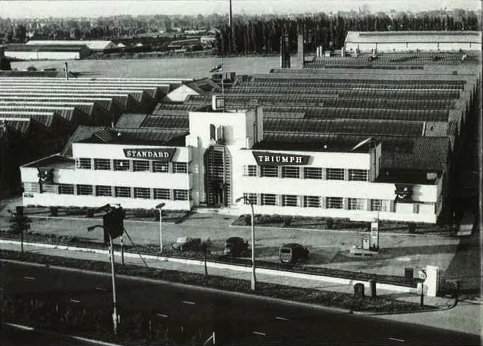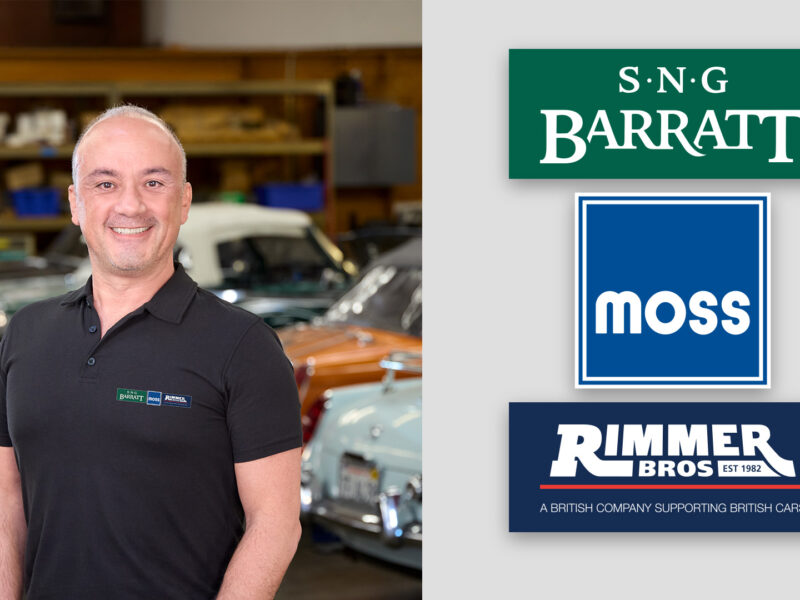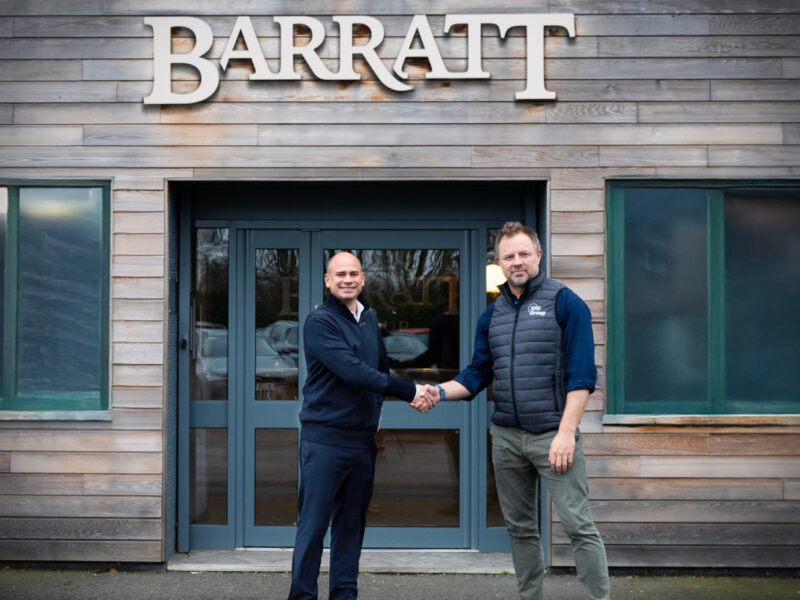Still Triumphant
By Paul Richardson
The ebb and flow of life often bring upon us career changes, and my mechanical apprenticeship took the form of two distinct halves. The first half was recounted in the last issue of Moss Motoring, and the second half was spent in the experimental department of TVR cars in Blackpool, a particularly enjoyable experience where I was also involved in the preparation of works competition cars. Unfortunately, TVR went into liquidation two or three years after I joined the company (it wasn’t my fault!), but through another quirk of fate I was to join Standard Triumph Sales Division in London, while still fostering my passion for racing cars by working on them over the weekends at home.
After TVR went belly up, my father, Ken Richardson, suggested that I should forget nuts and bolts and racing cars for a while and get a job in sales with a motor manufacturer to round off my knowledge of the motor industry. This advice was essentially due to the fact that my father knew that I wished to start my own tuning and motor business at some stage in the future.
I’d heard from friends who lived in ’60s London that the place was full of pretty ladies from all corners of the globe, and having decided to flee the nest at home, as it were, I decided that a sales job with a major manufacturer in London would be the best of both worlds, increasing my working knowledge of the motor industry and finding out what delights Britain’s capital had to offer!
“I know just the man to contact,” my father said. The man was A.G. “Jock” Brown, who was the London sales and service manager for Standard Triumph. He was a Scot, an immaculate man who always wore a red rose in his lapel and who knew his job and the motor industry inside out. He joined the Standard Motor Company in 1936, and his reputation for exactitude soon became noticed. Jock became chief inspector of car production, the machine shop, and, later, tractor production. He eventually became workshop manager at the service department at Allesley in Coventry, and thence to London circa 1960.
I had been warned by my father, who’d known Jock for many years, that Jock was a meticulous man who would stand no nonsense, and Ken’s general warnings about Jock built up in me the sort of fear that develops into respect. I firmly believe that there is nothing wrong with being fearful by way of respect of anyone who, by example, knows their job, is a good human being, and has the respect of his or her contemporaries. Jock Brown was such a person.
My initial interview took place at the service department, which was situated on Western Avenue, Acton, on the outskirts of northwest London, where Jock Brown was based. I was dressed in a brand-new Austin Reed suit which had cost £17—a fortune in those days! As I walked into the service department, I noticed a peak cap above a small semi-circular viewing area at the top of the stairs in the center of the large reception area, which was next to the administrative offices. We called this the pulpit, and under this was the company commissionaire, “Major” John Murray, who, like Jock Brown, was also Scottish. Murray had seen service in WWII as an RSM with the Argyll and Sutherland Highlanders, and was essentially in charge of the reception area. He was well respected and could double for anyone, including Jock Brown, if need be.
I was led into Jock Brown’s office where Major Murray also took up residence, and throughout my interview, John, saying nothing, weighed me with an unnerving steely glare. My interview concluded, Jock said, “Well, laddie [he called everyone under 80 years of age “laddie”], I see you’ve passed your trade exams and you obviously know how a car works, but you don’t know how I work! The only one that b*****s about here is me, and to make sure you don’t b****r about, I’m going to keep you here at Western Avenue on reception for a few months so you can learn how to deal with people before you go to our Berkeley Square showrooms.” He continued, “Major Murray here can spot b****ring about from a thousand yards, so don’t try it…b****ring about, I mean.”
Now quite clear on Western Avenue discipline, I was introduced to Jock’s P.A. and number two, Dick Carter. However, my first day on reception was a nightmare! I booked in about 25 cars with assorted problems—from blown engines, broken windscreens, spinning clutches, and a thirst for routine service—with the promise that the cars would be ready for collection the next day (there were about 150 mechanics and staff at Western Avenue). The trouble started when the paperwork had been circulating for about an hour. “Mr. Richardson!” Major Murray bellowed from his pulpit. I walked over, and with that quickening Scottish brogue that joined up his words when he was angry, he said, “Hoo-the-hell-do-ye-think-we’re-gonnee-get-these-cars-oot-o-here-by-teemorrow-neet? We’re-still-bunged-up-wi’-work-from-last-weekend. Moorover-what-r-ye-goin-to-do-aboot-it?!”
In an attempt to lighten things up a bit, I made the mistake of asking John if he would take a bribe, and got my first Major rollicking. After volunteering to don a pair of overalls myself to help out with the problems I’d caused, things cooled down a bit and collection times were suitably adjusted.
Customers could also be a problem, especially if they decided on an “I’m going to be as awkward and unpleasant as I can” attitude. It must be realized that we receptionists were the front-line troops and bore the first barrage of abuse from irate customers. And, of course, there were always those know-it-all people who put everybody’s back up.
One such instance concerned one of several Triumph Herald Estates owned by a well-known fashion house in London. The engine was in a heck of a state with blown big ends, and it had more oil in the silencer than it did in the sump. The driver, who I thought was a chauffeur, was one of those obnoxious types who believed he knew everything about the problem, but in actual fact he couldn’t tell a split pin from a choke cable. After delivering his usual diatribe, he asked me what I thought the rattling engine noise was. I couldn’t resist it—I told him I suspected that the “water pump timing had slipped and let the tappet clearances fall into the sump!” Armed with my diagnosis, he left, but later that day I was called to Jock Brown’s office. The driver had reported his findings to his boss who, unfortunately for me, knew something about engines. The boss phoned Jock Brown and gave him a blood-curdling mouthful because a junior member of the Triumph staff (me!) had taken the mickey out of a customer who happened to be a SENIOR DIRECTOR of the fashion house!
So here’s me, on the carpet, in front of Jock. He said to me in his high tenor, “How the hell did you think you’d get away with telling one of our main customers that a water pump had delivered eight slices of fresh air about 15 thou thick to the sump of the Herald, causing big end failure!?” After a very severe reprimand, I made my way back to the reception area, where Dick Carter had been told the story of my misdemeanor by Major Murray. He leaned over the pulpit and said, “You’re lucky you’ve not been put on the Herald line changing water pumps and tappets for a month.”
My time at Western Avenue taught me more about people and how to deal politely and efficiently with them in awkward situations than I’d ever learned before or since. To give some idea of the workload for everyone at W.A., there was a permanent night shift and at least 50 jobs each day were booked in. These ranged from routine services, repairs, and engine changes to accidental damage, guarantee work, and pre-delivery inspection on new cars to be delivered to overseas customers at Western Avenue. Many of these new car deliveries resulted from sales at the main London showroom in Berkeley Square—the base I was soon to join.
One of the worst recurring problems we had at W.A. occurred after we had delivered a new car to a continental owner. Many of them had never driven on the left side (to them, wrong!) of the road before, and the exit onto Western Avenue led directly into a dual carriageway. We constantly emphasized that when joining the road, a LEFT turn must be made to drive up to a roundabout, where they could then turn round and head back into London on the other side of the dual carriageway. Far too many overseas customers, elated with their new cars, would lose concentration and turn right—only to drive up the wrong side of the dual carriageway. I don’t recall many serious accidents, but our body shop always seemed to be fully booked!
Jock Brown also used to obtain slightly scratched body shells from the factory at Coventry to sell to insurance companies for accident repairs. At one time, there were six Triumph 1300 body shells parked near the accident shop, and Jock directed a friend of mine (another Scot), Ray Ilay, to have them cut up and disposed of, as they were taking up useful workshop space. Two weeks later, the shells were still there, and Jock Brown called Ray and said words to the effect, “Mr. Ilay, I want those damned body shells cut up and scrapped today—if not sooner, laddie!”
Within seconds, Ray was on the roof of one of the 1300 shells with a five-pound sledgehammer, showing a 6’5” boiler room worker how he wanted the shells completely smashed before cutting them up. The boiler room worker, with style and great elan, proceeded to decimate all six of the body shells. An hour later, Jock phoned Ray and said, “For heaven’s sake, don’t scrap those shells, laddie—I’ve just sold all six!” Ray was in deep trouble, but it served him right for not reading Jock’s mind, an essential requisite at Western Avenue!
Jock Brown was a true character in the best sense of the word, but he ran Western Avenue very efficiently and received commendations regularly from Sir Donald Stokes. Jock died about five years ago, and the world is a lesser place without him.








'Still Triumphant' has no comments
Be the first to comment this post!